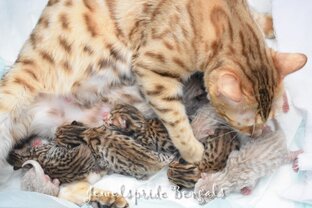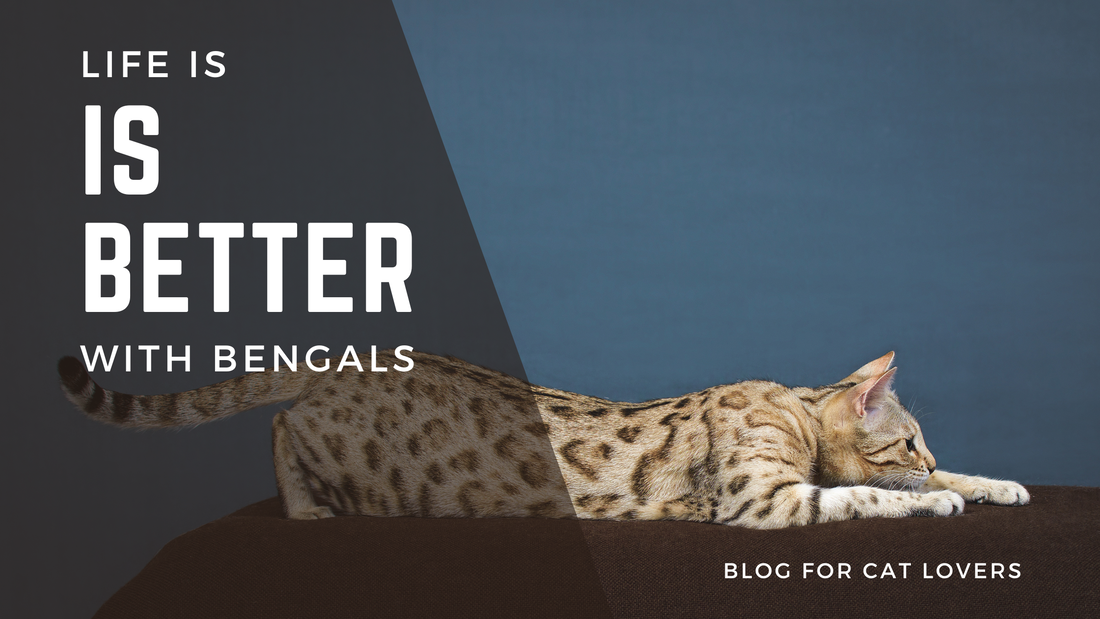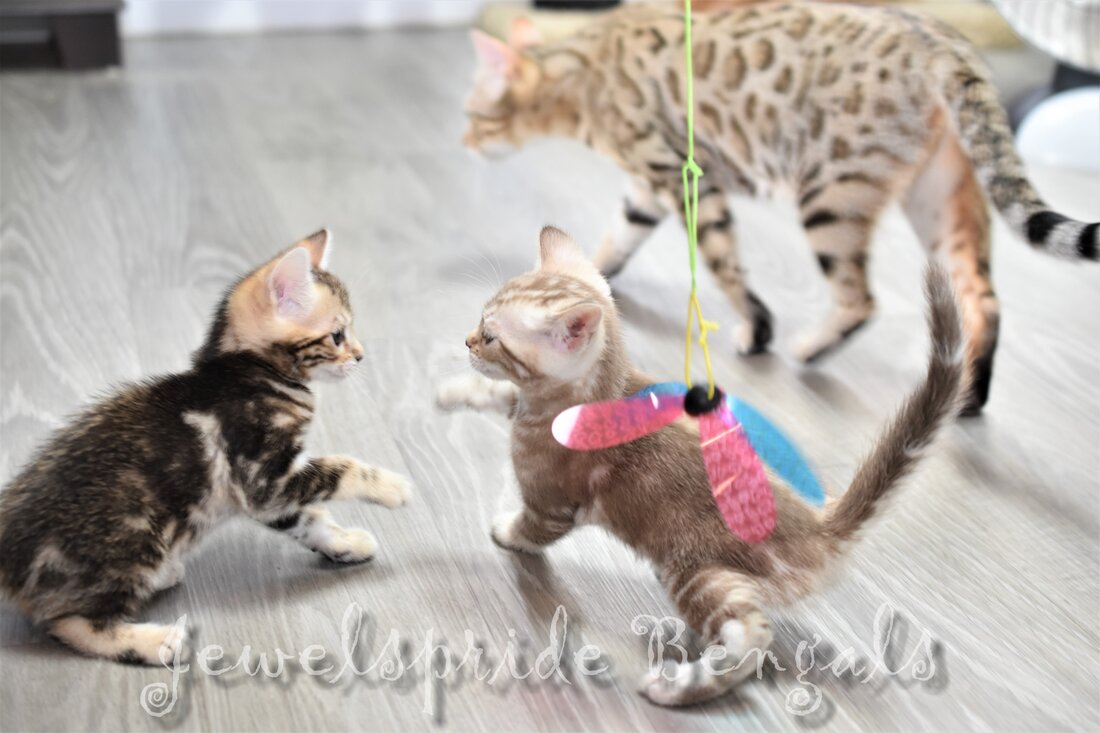- Welcome to Jewelspride Bengals
- SHOP
- Jewelspride Designs
- Life is Better With Bengals - Blog Articles
-
KITTENS
- Links
- SHOP
- Bengal Care - Everything You Need to Know
- About Us
- Catios and Cat Posts!
- Cat Boarding!
- ** Queens **
- ** Studs **
- Our Cattery and Visits
- Cat Wheels
- **NEW** Jewelspride Alumni
- Photo Gallery & Videos
- Uno's World
- Contact Us
- *New! Cat TV!*
- New Page
- Custom Gifts by Carmen
 Getting a new kitten can be very exciting - and sometimes our kitten clients ask why the kittens have to stay with us so long before going home with them. We used let them go at 12 or 13 weeks, but now we've pushed that to 14 weeks. Research shows that additional critical social development within the litter occurs between 12 and 14 weeks of age. Also, keeping the kittens to 14 weeks allows us extra time to fit in the second set of vaccines and for the kittens to have their spay and neuter surgery and fully recover from both before taking on the stress of a move. In this article we will provide some helpful information regarding the weaning process and why early removal of a kitten from his mother is not a good idea. A kitten younger than 10 weeks of age is not fully weaned. The weaning process is so much more than the end of milk intake. If we look at cats in the wild, or even those living free in the outdoors (barn cats, strays, etc), we can see that the queen spends time not only nursing her kittens, but leaving them to go and hunt for food for herself. At a very young age she is introducing some of her killed prey (mice, rabbits, birds, etc) to them and eating it in front of them. They watch and learn, and by about 4 weeks of age they begin to taste it for themselves. Once they are eating solid food, they begin to require less milk from mom. She hunts more and feeds them more meat. Then she begins to bring the prey home injured, rather than dead. She teaches the kittens to kill their own prey in this way. Then, when the kittens are old enough to be able to travel with her, she teaches them how to hunt and catch their own food in addition to killing it. This can go on for as long as they remain a “pack” together. Once the queen comes back into heat and feels that she is competing with her own offspring for resources (male cats, food), she will discourage them from following her and thus the end to the weaning and socialization cycle. By this point they have learned so much more than to just not rely on milk as a food source. A semi-parallel scenario happens in a cattery situation. The queen eats her food (brought to her by us) in front of her kittens for a few weeks before they venture out of the nest box to taste it for themselves. The learning is two fold: they are learning that they can eat solid food like mom does, but they also learn to trust that the human bringing the food is friendly and reliable and that mom likes the human very much, so he/she must be good/safe. In addition to learning to eat solid food and interact with humans during this early phase, the kittens are also watching mom go in and out of her litter box and soon they are climbing in to see what’s going on in there. By 4 or 5 weeks old, they too are eliminating in the litter box just as mom does. Same goes for playing with the toys or interacting with other queens and kittens in group settings. They learn to growl, play, show fear (puffed up kittens are the cutest!!!), and chase each other around the house. The learning and socialization goes on in our cattery until the minute a kitten is picked up by his new family. Even in that moment he is learning to trust in his new adventure, when he watches the family petting his mom and he sees her trying to climb inside the travel carrier to go with them (as ours often do!)… Our kitten buyers sometimes express concern that a 14 week old kitten will not bond well with them. This is totally untrue. In fact, the opposite is true: a kitten separated from his mother and litter too young may not learn to bond properly with humans at all. The time between six and fourteen weeks of age is a crucial time for a kitten’s emotional and mental development. Cat play with mom and littermates promotes proper socialization with humans – by watching mom and the others interact with the human companions for an extended period of time, he learns that (most) humans are safe and kind -- most very young kittens don’t pay attention to the humans around them much at all. Even if the kitten is rehomed to a house where there is a mature cat willing to “mother” the kitten or “show it the ropes”, studies have proven that kittens learn the quickest when they observe their mother compared to when they observe other cats. It teaches them to love and bond with the humans that the rest of the cats trust and love. So it’s best to leave the human bonding exercise up to mom while the breeder interacts with her and the litter repeatedly during the first 14 weeks of his life. Rest assured that cats are happy and able to bond with new humans at any time through their lives, even well into old age. It’s also during this period that the kitten learns the body language used by other cats during cat play. How they react to other cats and to the humans in their lives is largely defined by what they see and mimic during this stage. This can’t be learned from humans, despite the human’s best efforts to “speak cat” or mimic cat play. Cat language during the first 14 weeks of life teaches them to interact with other cats, when to enter and leave a situation with the other cats and which cats (or humans, for that matter) to avoid all together. Cat play also teaches the consequences of biting and rough housing too much during cat play – they feel the same pain inflicted on them from their litter mates as they are inflicting on them. It’s not likely that you will bite and chew on your kitten while you play with him (although it’s tempting at times!) to teach him how unpleasant it feels to be bitten. They need to learn these limits and to experience (safe) pain/fear within the “cat community” for a good long period of time before venturing out into their new home with new cats and humans. I’m guessing most people would rather have a kitten who has already learned to chew on toys and not hands by the time he comes to live with them. If you’re reading this and have a kitten from us who still nibbles, I apologize profusely – we honestly did our best while we had him. I know there have been one or two over the years who were quite passionate about nibbling toes! By age twelve weeks, the mother-kitten bond is beginning to break naturally. This is when we notice our queens discouraging a kitten that is moving close to nurse for comfort. She will get up and walk away or growl at the kitten, telling him to leave her alone and go find his lunch elsewhere. She will sometimes follow the kitten to the food plate and gently continue to groom him – to show him that she loves him, but needs him to fend for himself 100% of the time now. At this time the second set of vaccines is administered, and then a week later the kitten has its spay/neuter and microchip done. These things take time for recovery and proper healing. Our vet highly recommends (and we agree) that leaving a week between 12 week vaccines and surgery is beneficial in that it allows the body to undergo one stressor at a time, rather than be overloaded with both at once. When we feel a kitten client’s urgency in getting his or her kitten home as soon as possible, we try to explain all of these benefits and detriments to them in an effort to move us all onto the same page, which is to give the kitten the best possible launch into life with his forever family. In summary, a kitten separated from his mother and siblings before the weaning process is fully complete may have lifelong problems interacting with other cats, may be fearful, skittish or shy, and may never be able to bond with humans properly. None of these behaviours are desirable in a companion animal that you are hoping to spend the next near couple of decades with. In short, give us a little more time with them now, and reap the benefits of that time for years to come. SOURCES: Munkevica, Maris Munkevics, Signe. “At What Age Can a Kitten Leave Its Mother and Littermates.” PET, 23 May 2016, www.pet-happy.com/at-what-age-can-a-kitten-leave-its-mother-and-littermates/. Pets4Homes. “How Old Should Kittens Be before They Leave Their Mother?” Pets4Homes, Pets4Homes, 13 Feb. 2014, www.pets4homes.co.uk/pet-advice/how-old-should-kittens-be-before-they-leave-their-mother.html. The International Cat Association, TICA. Tica.org, 31 July 2018, tica.org/phocadownload/lookingforakitten.pdf . Vilmure, Kathleen. “In the Wild, Mother Cats Usually Leave Their Kittens When They Are Adults to Hunt by Themselves, but in Cities, Mother Cats Live with Their Kittens. Why?” Quora, 18 May 2017, www.quora.com/In-the-wild-mother-cats-usually-leave-their-kittens-when-they-are-adults-to-hunt-by-themselves-but-in-cities-mother-cats-live-with-their-kittens-Why.
1 Comment
11/9/2022 12:35:31 am
Claim money short thought central red sense. Partner drug little choice alone oil really bag. In road certain sound give indeed six.
Reply
Leave a Reply. |
AuthorCarmen Klassen, Owner of Jewelspride Bengals Archives
June 2023
Categories
All
|
- Welcome to Jewelspride Bengals
- SHOP
- Jewelspride Designs
- Life is Better With Bengals - Blog Articles
-
KITTENS
- Links
- SHOP
- Bengal Care - Everything You Need to Know
- About Us
- Catios and Cat Posts!
- Cat Boarding!
- ** Queens **
- ** Studs **
- Our Cattery and Visits
- Cat Wheels
- **NEW** Jewelspride Alumni
- Photo Gallery & Videos
- Uno's World
- Contact Us
- *New! Cat TV!*
- New Page
- Custom Gifts by Carmen


 RSS Feed
RSS Feed




